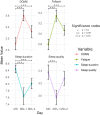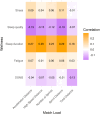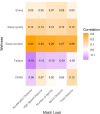Effect of match load on perceived wellness in highly trained female football players
- PMID: 40258006
- PMCID: PMC12011230
- DOI: 10.1371/journal.pone.0321505
Effect of match load on perceived wellness in highly trained female football players
Abstract
Background: Exposure to match loads significantly affects physiological and psychological indicators and, consequently, players' wellness. However, this information is still scarce in women's football. Therefore, the aims of this study were twofold: a) to compare the wellness variation from matchday (MD) to two days post-match (MD+2); b) and to analyse the correlations between the players' external load on MD and the self-reported wellness on the day after the match (MD+1) and MD+2.
Methods: This retrospective cohort study included data from 22 weeks and 33 official matches from 18 professional and semi-professional female football players competing in the Norwegian top-tier. Signals for total distance, high-speed running distance (>16 km/h-1), sprint distance (>20 km/h-1), acceleration distance, and number of sprints were collected using a Global Positioning System. Sleep duration and four wellness subsets were included in this study: sleep quality, delayed onset muscular soreness, fatigue and stress levels. Individual models were run using the respective wellness variable as the dependent variable, with matchday as a predictor. Data was modelled using cumulative link regression models. The model allowed random slopes for subjects to account for repeated measurements. Correlation analysis was computed using Spearman's rank correlations.
Results: Our results from the cumulative link regression model suggest that fatigue increased on MD+1 (Estimate: 1.30; SE=0.16; p<0.001) and remained elevated on MD+2 (Estimate: 0.75; SE=0.15; p<0.001), when compared to MD. Sleep quality decreased on MD+1 (Estimate: -0.72; SE=0.14; p<0.001). Sleep duration decreased on MD+1 (Estimate: -0.70; SE=0.13; p<0.001) and on MD+2 (Estimate: -0.61; SE=0.13; p<0.001). Moderate correlations were observed on MD+2 between sleep duration and acceleration distance (0.32, p<0.001) and high-speed running distance (0.30, p<0.001).
Conclusions: Competitive matches are associated with a disruption in the stability of the players' sleep patterns and wellness. The results also suggest that univariate external load measures may not be strong enough to predict the players' wellness status variation in the days following matches.
Copyright: © 2025 Baptista et al. This is an open access article distributed under the terms of the Creative Commons Attribution License, which permits unrestricted use, distribution, and reproduction in any medium, provided the original author and source are credited.
Conflict of interest statement
IB is affiliated with CIFI2D, which is financed by the Portuguese Foundation for Science and Technology (https://doi.org/10.54499/UIDB/05913/2020) outside of the submitted work.
Figures
Similar articles
-
Influence of Prematch Perceived Wellness on High-Intensity Locomotor Activities of Professional Soccer Players During in-Season Matches.Int J Sports Physiol Perform. 2024 Dec 11;20(2):192-199. doi: 10.1123/ijspp.2024-0249. Print 2025 Feb 1. Int J Sports Physiol Perform. 2024. PMID: 39662485
-
The relationship between wellness and training and match load in professional male soccer players.PLoS One. 2023 Jul 31;18(7):e0289374. doi: 10.1371/journal.pone.0289374. eCollection 2023. PLoS One. 2023. PMID: 37523395 Free PMC article.
-
No Influence of Prematch Subjective Wellness Ratings on External Load During Elite Australian Football Match Play.Int J Sports Physiol Perform. 2020 Feb 13;15(6):801-807. doi: 10.1123/ijspp.2019-0395. Print 2020 Jul 1. Int J Sports Physiol Perform. 2020. PMID: 32053792
-
Match Running Performance in Young Soccer Players: A Systematic Review.Sports Med. 2019 Feb;49(2):289-318. doi: 10.1007/s40279-018-01048-8. Sports Med. 2019. PMID: 30671900
-
High-Intensity Acceleration and Deceleration Demands in Elite Team Sports Competitive Match Play: A Systematic Review and Meta-Analysis of Observational Studies.Sports Med. 2019 Dec;49(12):1923-1947. doi: 10.1007/s40279-019-01170-1. Sports Med. 2019. PMID: 31506901 Free PMC article.
References
-
- FIFA. Grow the participation - Member Associations Survey Report; 2023. Available from: https://inside.fifa.com/womens-football/member-associations-survey-repor...
MeSH terms
LinkOut - more resources
Full Text Sources




